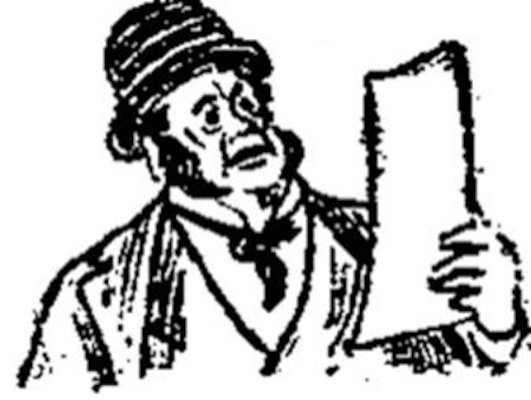This article has been transcribed from a copy of the Cardiff Times in the online collection of scanned Welsh newspapers 1804-1919 in the National Library of Wales, with grateful recognition of the free access accorded to all readers. Paragraph breaks have been introduced for easier reading. —— David Skilton

‘Booing Booing’ with a crooked back – that is the way of the politician.
Politics, sir, are my abhorrence, let me at once say. Being naturally of a suspicious and sceptical nature, I plead guilty to not believing in the notions of any politician that ever was created – but I do to a limited extent admire the utterances of certain of the greater of our contemporary politicians, probably because I read so few of them. But it is the over-enthusiastic admirers of these men – the admirers in a comparatively humble sphere of life – who afflict me. It is impossible for me to argue politics with a man who, I feel certain, knows nothing whatever of what he is talking about especially as I knew less. Do these man, I wonder, ever read the speeches that are reported in the newspapers at absurd and inordinate length? I cannot believe that they do. If they did, I feel assured that they would die young – die ere they could tell the story. I do not know what political big-wigs themselves think about the men who have good memories for speeches and are constantly raking up ancient utterances of the said politicians which are wholly at variance with more recent expressions and sentiments, but I hold them to be social pests who ought to be ruthlessly exterminated.

The man who is not to be ‘sat on’ politically. ‘I know what I know, look you.’
One ventures upon an expression of opinion, say, regarding some matter to which one is in reality quite indifferent, and one of these nuisances begins in an oracular manner to ask one a conundrum. Raising his voice very high, he asks in a severe tone, ‘Do you know what Mr Gladstone said in 1865, sir?’ This quite takes one aback, and one meekly owns that one has not the remotest idea what Mr Gladstone said either in 1865 or the following year, or any other year. ‘No, sir, you don't,’ he rejoins with an air of conscious triumph. ‘You do not make yourself acquainted with the subject; Mr Gladstone said this, sir,’ and then he quotes some utterances having not the remotest bearing on your original remark, and looks round for approval from a set of people who don't care one straw whether he is right or wrong, but who, rather than hazard an original remark, say dubiously, ‘Aye, there's a varry deal o' truth in that,’ or [‘]Just so.’ If you asked the latter man ‘Just what’" he wouldn't be able to tell you what the oracular man was talking about.

Grand sentiments – excellent! (See the other man below reading the same item.)
The fact is that many a man who aspires to be thought a ‘bit of a politician’ acquires that reputation solely because he finds no one in a general way who even cares to contradict him. Those who can contradict him don't care to do so, and those who don't know what he is talking about think it best to hold their tongues. Nine men out of 10 who pretend to discuss politics do not in reality understand, except in the most imperfect way, anything of the political history of the party to which they imagine themselves to belong. In railway carriages, sir, I have often been what is called ‘tackled’ by an argumentative working-man regarding some trivial remark I might have made in relation to a paragraph I have been reading in the paper held before me. I may have casually remarked, we will say, that Salisbury has been going it again.’ Then have I been the target of a fusillade of remarks. But I flatter myself, sir, that I can pulverise a man of this sort. Being gifted in an army of fine words, I take the man back in a series of complicated sentences to the time of Julius Caesar, or further back still if need be. ‘Do you know,’ I say, ‘what Oliver Cromwell remarked to Abd El Kader at the battle of Seringapatam?’ and then I ‘gee’ on in quite an historical way, piling up one gross perversion of the truth on another, till my opponent gasps at my wondrous knowledge and feebly ejaculates, ‘Aye, that may be, but it doesn't alter the question.’

Abominable; the man must be mad.
In regard to our minor political orators, sir, I have been greatly struck by their methods o[f] delivering themselves. Each one generally has a political magnate who is the god of his idolatry and whose manner he makes a ludicrous attempt to emulate. Very likely he imagines that he rather resembles Salisbury personally, so, at once, he tries to reproduce his manner. He, on a platform, stares blankly into the region of the gallery, utters his words in a preternaturally thoughtful manner, and appears weighed down with the immense responsibility of his office – probably that of a member of the Board of Guardians [governing the local workhouse]. He dresses the part, too, and evidently likes to be told how like such and such a statesman he is. I know an intensely ugly man who flatters himself on his likeness to Bradlaugh – so of course he adopts the sentiments of his model and out-Bradlaughs Bradlaugh [see Hamlet III.ii.14] . The British reporter, my dear sir, is a long-suffering man. Consider what an amount of balderdash he is yearly compelled to listen to. Fancy the moral and physical effects of a continued course [of] some of the Cardiff or Swansea Town Council speeches. How soon might a man be expected to become a wreck on such a bill of fare? Concludingly (dare l use such a word, sir? I hate the ‘in conclusion’ of the average parson),the whole realm of politics may be summed up in the glorious Shakespearian quotation, ‘Words, words, words!’ [Hamlet II.ii.195.] A glib tongue, a hollow heart, and by no means infrequently a hollow head, carry a man to great heights as a professional politician.
Last modified 13 March 2022